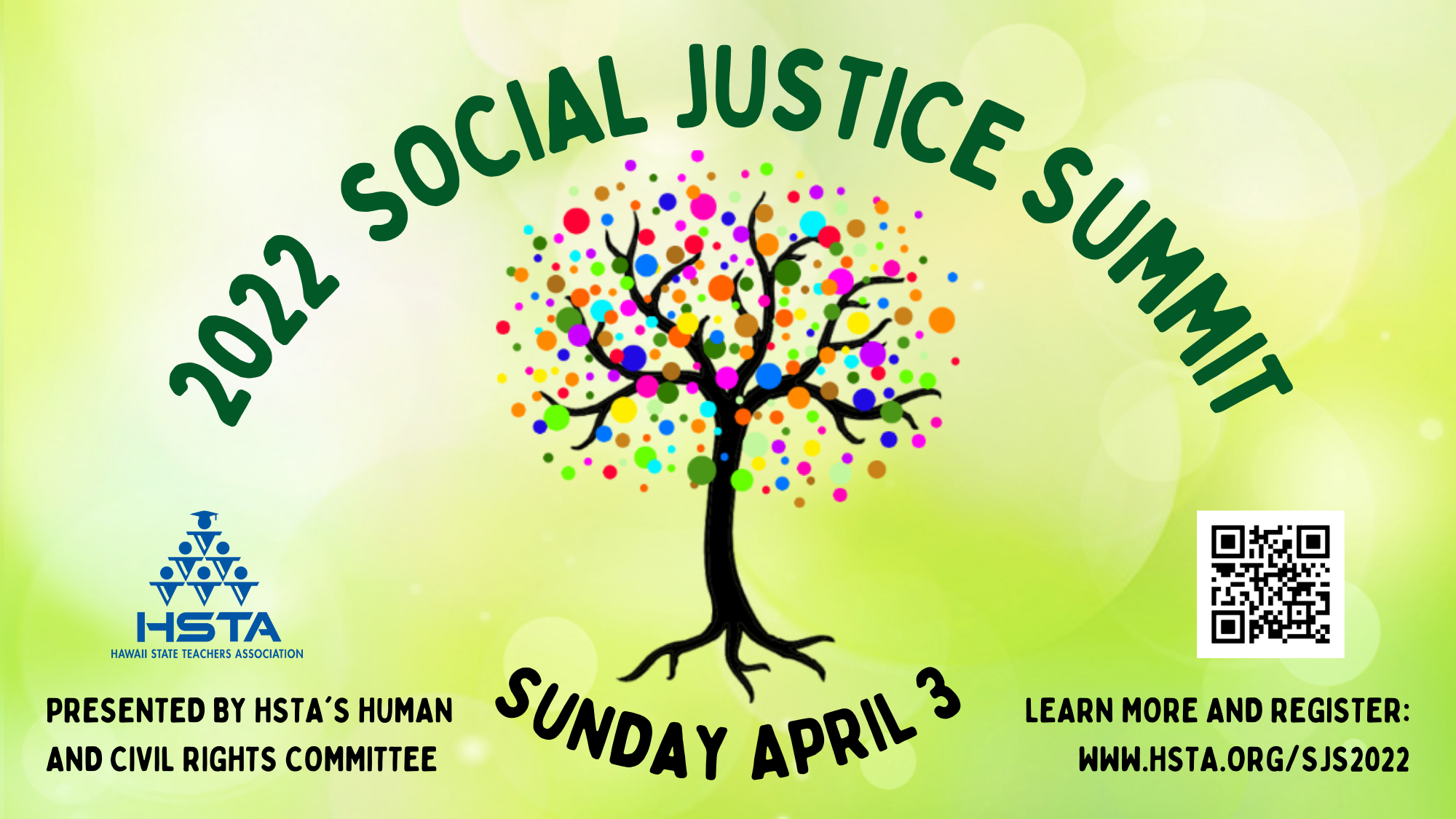
2022 Social Justice Summit presented by HSTA’s Human and Civil Rights Committee
Virtual event offers strategies and support to build equity in our schools and communities
News Release from HSTA, March 15, 2022
The Hawaii State Teachers Association Human and Civil Rights (HCR) Committee is proud to present its 2022 Social Justice Summit on Sunday, April 3, on Zoom. This event is free and open to the public.
Do you have students whose families come from historical trauma? What about students who identify as transgender or are questioning? Do your students who are Micronesian need more support? Do you notice people around you suffering from COVID burnout?
HSTA’s 2022 Social Justice Summit will offer strategies and support to help all educators tackle these difficult situations in our schools and communities. Students, parents, and supporters are also welcome to join the conversation!
What is social justice?
“Social justice refers to a concept in which equity or justice is achieved in every aspect of society rather than in only some aspects or for some people. A world organized around social justice principles affords individuals and groups fair treatment as well as an impartial share or distribution of the advantages and disadvantages within a society.” (Teaching for Diversity and Social Justice, Adams, Bell, Griffin, 2nd ed., Routledge 2007)
“HSTA’s Social Justice Summit is a setting where no one is tiptoeing around the issues. We’re here for the issues. We’re creating space for people to listen, and share like compassionate, intelligent human beings,” explained Elizabeth Sharrock, HSTA HCR Committee vice chair.
“We will be surrounded by good people who are also exhausted, distressed, and concerned. Just know, we’ll be coming from a solution-based mindset,” Sharrock said. “Maybe part of the solution is simply to go in knowing that we might feel discomfort. Maybe we don’t have the answers to the tough questions. In fact, we may find we have a lot of insecurities and misgivings. But the point is we’re willing to enter the space so we can learn from each other.”
REGISTER
Schedule
9 to 9:15 a.m. Welcome
9:15 to 10:15 a.m. Workshop session #1
10:15 to 10:30 a.m. Break
10:30 to 11:30 a.m. Workshop session #2
11:30 a.m. Closing and next steps
Workshops
Workshops will be conducted via breakout rooms during the event. No additional registration is necessary. Click on a workshop to learn more and view additional resources. Please note, workshops are subject to change. Swipe on mobile or rotate your device to view the full workshop list.
Workshop descriptions and resources
Transgender 101 for Educators
Presenter: Daphna Ehrenhalt, HSTA HCR, Hilo Chapter
This session that explores ways educators and allies can build strong communities that support our transgender youth. Learn how to support your students by understanding key terms, the importance of pronouns, the difference between gender identity and sexuality, and Hawaii State Department of Education guidance.
Visit our Transgender 101 for Educators resource page
Transgender 102 for Educators
Presenter: Kaleo Ramos, HSTA HCR, Honolulu Chapter
Please check back for workshop description.
Understanding Implicit Bias, Microaggressions, and Stereotypes
Presenter: HSTA CARES (Culture, Advocacy, Respect, Equity, Support) professional development and training team
Implicit bias refers to the attitudes, beliefs, or stereotypes that affect our understanding, actions, and decisions in an unconscious manner. These biases often manifest themselves in the forms of microaggressions and stereotypes. Everyone has implicit bias, but few of us are aware of it and how it impacts our daily experiences. For educators, implicit bias may have a negative effect on our students’ behavior and academic outcomes. This two-part workshop will explore examples of different implicit bias, microaggressions, and stereotypes, and how they shape our perspectives, the perspectives of our students, and our schools.
Supporting Our Micronesian Students
Presenter: Nicole Heinlein, HSTA HCR, Maui Chapter, and Paul Hadik, president & CEO, PREL (Pacific Resources for Education and Learning)
Learn about the history of the Compacts of Free Association (COFA) and their impact on the migration of islanders to Hawaii. Participants will discuss cultural practices, differences and similarities to assist in dealing with the challenges of understanding Micronesian culture. This workshop will assist teachers by providing models and instructional strategies that can be used within the classroom to support students, focusing on topics such as parental engagement, home life, health issues, and school attendance.
Addressing Trauma in the Classroom
Presenter: Florence Scott, HSTA HCR, Kauai Chapter, and Lisa Barton, HSTA HCR, Leeward Chapter
Trauma is complex, comes in many forms, and impacts different people in different ways. This workshop will focus on understanding trauma so educators can be responsive to the individual and collective needs of students. We will discuss the nuances and limitations of the Adverse Childhood Experiences (ACEs) quiz and address collective trauma from the COVID-19 pandemic. Trauma-informed teaching is not a response to individual student behavior; it’s a shift in perspective that honors unconditional positive regard for each human being in the shared space. Participants will learn how to use this understanding to shift approaches in the classroom.
Building GSAs and Supporting LGBTQIA+ Educators and Students
Presenter: Sarah “Mili” Milanta-Laffin, HSTA Leeward Chapter
GSA used to stand for Gay Straight Alliance. The acronym has been updated to Gender Sexuality Alliance to be more inclusive. In many schools, GSAs are safe spaces for LGBTQ+ students and allies who support them. If you’d like to start a GSA on your campus, this session will connect you with everything you need to know to become a GSA faculty sponsor. If you’re not ready to start a GSA or feel like this club would not be welcomed on your campus, we’ll share strategies to make your classroom a more inclusive learning environment for LGBTQ+ students.